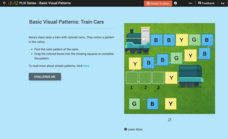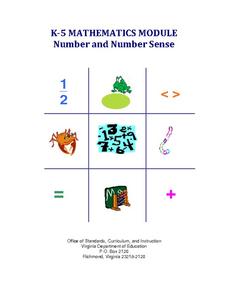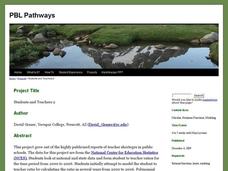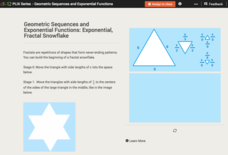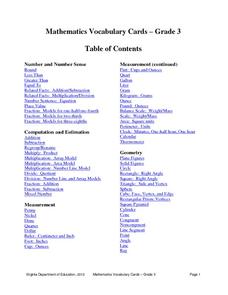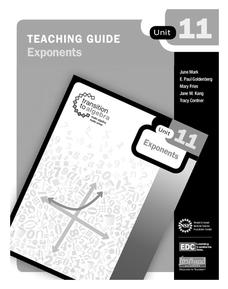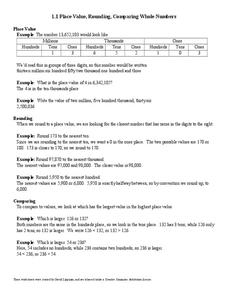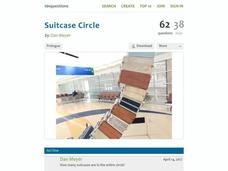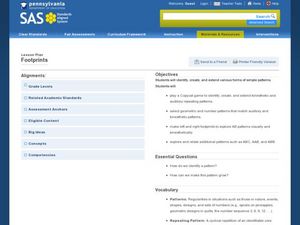Curated OER
Missing Numbers to Twenty
Which number is missing? Beginning counters examine twenty-six number sequences, one for each letter of the alphabet. Each sequence has four numbers, ranging from one to 20. There is one number missing from the sequence, and learners...
Concord Consortium
The Bus Route
Patterns are extremely helpful when solving a puzzle. Young scholars attempt to find times a bus will pass each stop. They identify a pattern in the known stop times to identify the solutions.
CK-12 Foundation
Basic Visual Patterns: Train Cars
An interactive comprised of five questions challenges young scholars to complete a simple pattern. After examining a train with colored carts, learners arrange a green, blue, and yellow block into their corresponding space. Questions are...
Curated OER
K-5 Mathematics Module: Number and Number Sense
Reinforce number sense with a collection of math lessons for kindergarteners through fifth graders. Young mathematicians take part in hands-on activities, learning games, and complete skills-based worksheets to enhance proficiency in...
Mathematics Assessment Project
Patchwork
Sew up learning on writing rules for patterns with an assessment task that has pupils investigate the number of triangles needed for cushions of different sizes. They then use the data to generate a rule for a cushion of any size.
02 x 02 Worksheets
Inverse Variation
Discover an inverse variation pattern. A simple lesson plan design allows learners to explore a nonlinear pattern. Scholars analyze a distance, speed, and time relationship through tables and graphs. Eventually, they write an equation to...
PBL Pathways
Students and Teachers 2
Examine trends in student-to-teacher ratios over time. Building from the first task in the two-part series, classes now explore the pattern of student-to-teacher ratios using a non-linear function. After trying to connect the pattern to...
CK-12 Foundation
Exponential Growth: Exponential, Fractal Snowflakes
Examine an exponential growth model. Using a fractal, learners calculate the perimeters of each stage. When comparing the consecutive perimeters, a pattern emerges. They use the pattern to build an equation and make conclusions.
Math Mammoth
Grade 1 Worktext
Use graphing, counting, and number lines to help first graders learn about addition and subtraction. An array of worksheets and activities are an excellent resource for your math lesson, whether you are focusing on counting skills or...
Didax
Pi Day #1a – Discovering Pi
Unravel the mystery behind the infamous number pi. Scholars complete a series of activities that explores where pi comes from, its digits and estimation strategies. Pupils should be ready to measure, calculate, and look for patterns to...
Virginia Department of Education
Mathematics Vocabulary Cards - Grade 3
Need to go over some math concepts with your third graders? Use a series of math posters, featuring vocabulary words in geometry, measurement, fractions, probability, and many other areas of study. Each poster presents the term with an...
Geography 360°
Exponents
Don't let the rules overrule the lesson. Mental math steps in and helps learners understand exponent patterns. The material focuses on the introductory problems of exponents, such as simplifying expressions. Teacher guides are...
Mathematics Assessment Project
College and Career Readiness Mathematics Test B1
Math was easier before it got mixed up with the alphabet. A 10-page test covers material from multiple years of high school math. Scholars demonstrate knowledge across domains with a mixture of short answer and applied problems.
Mathematics Assessment Project
Middle School Mathematics Test 6
A thorough math test divides the content into two 40-minutes sections, covering material through algebra and geometry. Problems incorporate analysis and applied problem solving.
Open Text Book Store
Arithmetic for College Students: Worksheets
Loaded with concepts ranging from multiplying decimals to converting units to solving problems using the order of operations, a thorough practice packet is perfect for a fifth or sixth grade math classroom.
CK-12 Foundation
Direct Variation: Value of a Painting
Help your pupils find a pattern of direct variation. Young scholars use input-output pairs to find a constant of variation and then write the equation. As they build their equations, the interactive lesson provides feedback.
101 Questions
How Many Hot Dogs?
Top off your hot dogs with a little math. Learners view a video on a hot dog eating contest, and then answer questions using estimation. Using a table of hypothetical data, they create algebraic expressions to represent the situation.
101 Questions
Suitcase Circle
Analyze patterns in a circular arrangement. After using a geometric construction to complete a circle, learners use proportional reasoning to make predictions. By determining the length of an arc built from suitcases, they estimate the...
101 Questions
Toothpicks
Analyze patterns and build functions. Young scholars work on their modeling skills with an inquiry-based lesson. After watching a video presentation of the problem, they write functions and make predictions.
Howard County Schools
To Babysit or Not to Babysit?
Would you work for a penny today? Use this activity to highlight the pattern of increase in an exponential function. Scholars compare two options of being paid: one linear and one exponential. Depending on the number of days worked, they...
Concord Consortium
Broken Spreadsheet I
There is power in spreadsheet formulas and learners use this power to model quadratic data. Given a scatterplot of a parabola, pupils create formulas in a spreadsheet to populate the data. The formulas they use lead to an understanding...
Concord Consortium
Leap Years and Calendars
How many birthdays do leap year babies have in a lifetime? Learners explore the question among others in a lesson focused on different calendar systems. Given explanations of the Julian, Gregorian, and Martian calendars, individuals use...
Curated OER
Building Big Ideas in Math: Frog Themed
In this math patterns instructional activity, students work to find the math pattern in 'The Lost Button' story. Students answer six questions about math patterns.
Curated OER
Footprints
Students explore patterns. In this patterns geometry lesson, students identify and extend patterns including body parts, movement, geometric shapes, noises, and footprints. Students create and share an original pattern.
Other popular searches
- Patterns in Math
- Elementary Math Patterns
- 100th Day Math Patterns
- Farm Animal Math Patterns
- Growing Patterns in Math
- Powerpoint Math Patterns
- Growing Patterns Math
- Math Patterns and Rules
- Math Patterns and Relations
- Number Patterns in Math
- Geometric Patterns in Math
- Inauguration Math Patterns




